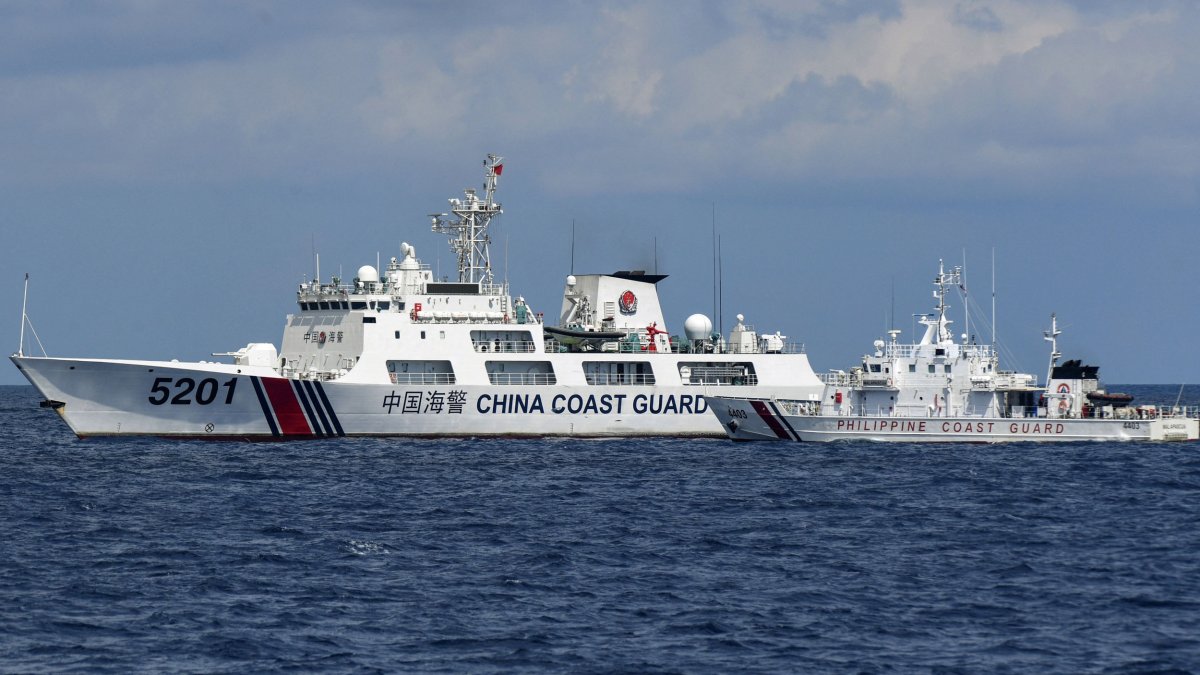China asserted on Friday that its territorial claims in the contested South China Sea are supported by a series of international treaties that date back to as early as the 1890s.
Newsweek has reached out to the Philippine Embassy in Beijing for comment by email.
Why It Matters
China has claimed sovereignty over most of the South China Sea, claims that overlap with those of neighboring nations, including the Philippines, a defense treaty ally of the United States. Maritime forces of Beijing and Manila have frequently faced off and even clashed.
Beijing has declared that China was the first to discover the South China Sea and thus has the so-called "historic rights" in the disputed waters within its "nine-dash line." However, this was rejected in 2016 by an international tribunal's ruling as having no legal basis.

What To Know
During a press briefing, the Chinese Defense Ministry spokesperson, Senior Colonel Zhang Xiaogang, said the Nansha Qundao (the Spratly Islands) and Huangyan Dao (Scarborough Shoal) "fall outside" the Philippine territory defined by international treaties.
The treaties cited by Zhang were the 1898 Treaty of Peace between the U.S. and Spain, the 1900 Treaty between the U.S. and Spain for Cession of Outlying Islands of the Philippines, and the 1930 Convention between the United Kingdom and the U.S. with regard to the border between North Borneo and the Philippines.
Spain ceded sovereignty over its Philippine colony after its defeat in the Spanish-American War in 1898. The U.S. granted the Philippines independence in 1946 and both countries signed a mutual defense treaty in 1951.
The Chinese law-enforcement activities in the Spratly Islands and Scarborough Shoal were "reasonable, lawful, and beyond reproach," Zhang added. Both are within the Philippine 200-nautical-mile exclusive economic zone but outside its 12-nautical-mile territorial sea.
The Chinese military's remarks came after Ferdinand Marcos Jr., the Philippine president, demanded China stop its aggression in the South China Sea, in exchange for the removal of the Typhon missile system, currently deployed in the Philippines by the U.S. military.
China has repeatedly voiced its objections to the Typhon deployment, which can strike targets 1,000 miles away. "The Typhon missile system is a strategic asset and an offensive weapon," said Zhang. Washington has made clear that the weapon is not nuclear-capable.
What People Are Saying
Senior Colonel Zhang Xiaogang, spokesperson for the Chinese Defense Ministry, said at a press briefing: "By using the deployment of Typhon as a bargaining chip on the South China Sea issue, the Philippine side is selling out its own national security, putting the well-being of its people and regional peace and stability at grave risk. Such behavior is ridiculous and dangerous."
Philippine President Ferdinand Marcos Jr. previously told reporters: "I don't understand the [Chinese] comments on the Typhon missiles. We don't make any comments on their missile systems, and their missile systems are a thousand times more powerful than what we have."
Collin Koh, senior fellow at Singapore's Institute of Defense and Strategic Studies, wrote on X (formerly Twitter): "First, features sitting in [the Philippine exclusive economic zone] not 'territory,' though their legal statuses (island or rock) constitute another matter altogether. Second, some ancient Chinese maps don't even include the [South China Sea] clusters of features. Maybe we can also start interrogating those inconsistencies?"
What Happens Next
China will continue to pressure the Philippines on the territorial disputes in the South China Sea and the U.S. missile system deployment. U.S. Secretary of State Marco Rubio has reiterated Washington's support for its "ironclad" mutual defense treaty with Manila.
About the writer
Ryan Chan is a Newsweek reporter based in Hong Kong, where he previously had over a decade of experience at ... Read more



